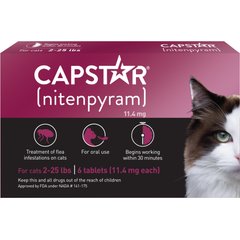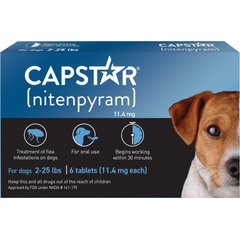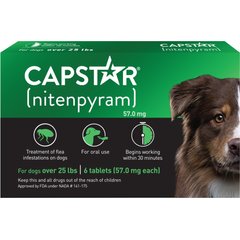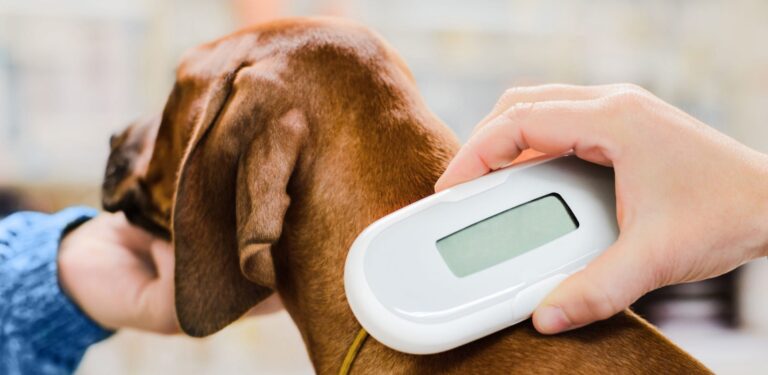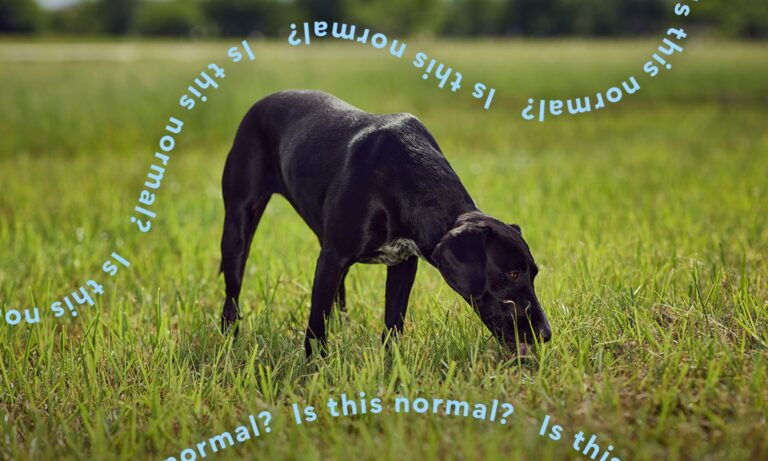Is Capstar Safe for Dogs and Cats?

Photo by LightFieldStudios/iStock/Getty Images Plus via Getty Images
This content was reviewed by a veterinary professional to answer your most common questions about this topic. This content shouldn’t take the place of advice by your vet. No writer or qualified reviewer has received any compensation from the manufacturer of any medication as part of creating this article.
Fleas are the worst. They cause a lot of discomfort for your cats and dogs, and even more concerning, flea bites can result in problems like cat scratch fever and flea allergy dermatitis. And, not to make this all about us, but no human wants to be bitten by fleas.
Should your furry friend end up with a flea infestation, oral flea medications such as Capstar®, which is FDA-approved for dogs and cats, can be a highly effective way to quickly kill the adult fleas that are making your furry friend miserable. However, it only lasts 24 hours, so it’s important to talk to your vet about a monthly preventive option for your cat or dog in addition to Capstar®. We spoke to vet experts to learn all about this over-the-counter oral tablet.
What Is Capstar®? And How Does Capstar® Work?
Capstar® is an oral flea medication for cats and dogs. The flea treatment works quickly, is highly effective, and is safe for daily use during a flea infestation. It’s so fast-acting that fleas will begin dying within 30 minutes of the first dose.
So, how does Capstar® kill fleas? The active ingredient, nitenpyram, is an insecticide that wipes out adult fleas. The nitenpyram enters your pet’s bloodstream and when a flea bites your furry BFF, the flea ingests the nitenpyram.
The insecticide then attacks the flea’s nervous system, causing paralysis and then death. It may sound a little gruesome at first—until we remember that we’re talking about fleas here! Then it sounds pretty good.
How Much Does Capstar® Cost?
The price of Capstar® varies slightly between the type of pet you’re treating (cat or dog) as well as their weight if your pet is a dog.
Recommended Products
How Long Does Capstar® Last?
Capstar® is fast-acting. One Capstar® tablet may have the tiny parasites dropping dead within 30 minutes. However, Capstar® is also short-lived. This super-simple flea treatment will continue working for 24 hours after administration, with all benefits ending by 48 hours.
Capstar® Side Effects and Adverse Reactions
Capstar® is considered safe for dogs and cats and is recommended by many vets.
Capstar® is generally well-tolerated by dogs and cats when used according to the label and your veterinarian’s instructions. Be sure to pay close attention to the age and weight requirements.
Keep in mind that each pet is unique and can experience side effects. Possible side effects of Capstar® include:
Dogs:
- Lethargy and depression
- Vomiting
- Itching
- Decreased appetite
- Diarrhea
- Hyperactivity
- Lack of coordination
- Trembling
- Seizures
- Panting
- Allergic reactions including hives
- Vocalization
- Salivation
- Fever
- Nervousness
Cats:
Capstar® Recommended Dose
Here’s the recommended Capstar® dose, per the product instructions:
| Pet | Weight | Dose | Nitenpyram per Capstar tablet |
|---|---|---|---|
| Cat or Dog | 2-25 pounds | One tablet | 11.4 mg |
| Dog | 25.1-125 pounds | One tablet | 57 mg |
Speak with your veterinarian to determine the correct dosage for your pet. Always follow your vet’s instructions and package insert instructions when providing this medication to your pet.
While Capstar® is effective in killing the adult fleas on the pet, it is not a preventive, and a monthly preventive should be used to help prevent re-infestation. Work with your veterinary care team to come up with the best flea treatment plan for your pet. It is also very important to remember to never use a flea medication or preventative labeled for only a dog on a cat—or vise versa.
Call your vet if your pet experiences severe side effects, your pet’s condition worsens or does not improve with treatment, or you see or suspect an overdose.
How To Administer Capstar® for Dogs and Cats
Speak with your veterinarian if your pet struggles to take Capstar®. Generally, they may recommend:
- Place the pill directly in their mouth.
- Hide the pill in food, making sure your pet actually ingests the Capstar® tablet. (Some dogs and cats are masters at eating the food and spitting out the pill.)
- Crush the Capstar® pill and mix it with a favorite food, like peanut butter. (Be certain the peanut butter doesn’t contain xylitol, as it’s toxic to dogs and cats.) Choose a food you know your pet will love, as there’s no recovering crushed pill powder if your dog or cat turns their nose to your offering.
Have a pet who isn’t fond of pills? Try one or more of our useful pill-giving tricks found in these guides:
How To Store Capstar®
Capstar® should be stored at controlled temperatures between 59–86 degrees Fahrenheit. To protect from light, keep tablets in their original packaging until they’re ready to use. Always follow the storage requirements as listed on the package label.
Keep Capstar® (and all other medications) out of reach of children as well as your dogs and cats.
Important Capstar® Considerations
Keep the following points in mind when considering Capstar® for your dog or cat.
- Follow the package label and your veterinarian’s instructions. Pay close attention to the minimum age and weight requirements for Capstar®.
- Ensure you’re using the correct Capstar® product for your type of pet (cat or dog) as well as the correct weight range on the label. There are three Capstar® products available, according to pet size:
- Dogs between 2–25 pounds
- Dogs between 25.1–125 pounds
- Cats between 2–25 pounds
- Capstar® is labeled as safe for use in pregnant and breeding dogs and cats.
- Capstar® is labeled as safe to use with most other medications and products, such as heartworm preventatives, deworming medications, antibiotics, corticosteroids, vaccines, and other flea products. However, please ask your veterinarian prior to use.
Don't Forget Flea Prevention
The best way to deal with fleas is to avoid them in the first place by using a monthly flea preventive. Your veterinarian can help you determine the right flea and tick prevention for your dog or flea and tick prevention for your cat.
However, if you’ve been lax about prevention by skipping those preventive treatment meds and now you’ve spotted fleas on your pets, Capstar® could save the day.
After you’ve used this fast-acting solution to clear up the flea infestation, don’t forget to take steps to prevent a re-infestation.
FAQs About Capstar for Dogs and Cats
Sara Ochoa, DVM, veterinarian at Animal Hospital of West Monroe in West Monroe, Louisiana, answers Capstar®-related FAQs.
Do vets recommend Capstar® for dogs?
“Absolutely. Many veterinarians, myself included, often advise the use of Capstar® for rapid relief from adult fleas. Its main component, nitenpyram, has shown significant efficacy in exterminating adult fleas from our furry friends.”
Does Capstar® work?
“Yes, Capstar® is effective. In fact, once administered, it springs into action within a mere 30 minutes. From my experience, pet [parents] frequently report a noticeable decline in the flea population on their pets shortly afterwards.”
How long does Capstar® work on cats?
“Capstar® offers swift relief but its effects are short-lived. Typically, its potency lasts for about 24 hours. For sustained results, consistent monitoring and potential follow-up treatments are paramount.”
Does Capstar® kill flea eggs?
“Capstar®’s prowess is in annihilating adult fleas. However, it doesn’t target the younger stages like eggs or flea larvae. To holistically tackle a flea problem, one must address both the pets and their environment.”
Does Capstar® kill ticks?
“Capstar® is specialized for fleas and does not exterminate ticks. If ticks are a concern, it’s pivotal to explore other treatments designed for that specific purpose.”
Is Capstar® safer than Frontline?
“Both Capstar® and Frontline® have unique modes of action and purposes. While Capstar® focuses on rapidly killing adult fleas, Frontline works more comprehensively, tackling both fleas and ticks over an extended period. In terms of safety, both are generally considered safe when used as directed. However, pets are as individual as humans, and what suits one might not necessarily suit another.”
Is Capstar® safe for pregnant dogs?
“Indeed, Capstar® has been deemed safe for use in both pregnant and nursing pets. Remember, every pet’s reaction to medication can differ, so it’s vital to closely monitor your pet after using Capstar®. As always, consultation with your vet is crucial before initiating any treatment.”
A fast-acting way to get rid of fleas, Capstar® is safe for dogs and cats alike. If you’re dealing with a flea infestation, check with your vet and give Capstar® a try.
Expert input provided by Sara Ochoa, DVM, veterinarian at Animal Hospital of West Monroe in West Monroe, Louisiana, and the co-founder of How To Pets; Jessica Stewart, DVM, veterinarian based in Altadena, California; and Dwight Alleyne, DVM, practicing veterinarian in Georgia.
This content was medically reviewed by Chewy vets.
